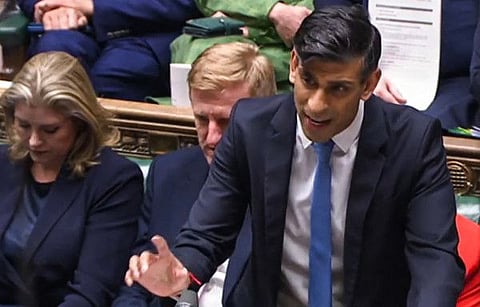Rishi Sunak faces UK parliament over decision to strike Yemen
‘It’s hard to think of time when there has been so much danger, insecurity, instability’

London: UK Prime Minister Rishi Sunak will address Parliament on Monday after his government said it’s ready to carry out further strikes on Al Houthi targets in Yemen if the group continues to attack commercial vessels in the Red Sea.
The strikes by US and allied forces last week have gone “some way” toward degrading Al Houthis’ capabilities, Foreign Secretary David Cameron said, but that the UK is prepared to take action again if necessary.
The situation in the region had been deteriorating and Sunak was right to participate before informing Parliament, he said, referring to the premier’s upcoming statement.
It will be Sunak’s first House of Commons appearance since he also made a surprise visit to Kyiv to announce a new security commitment to Ukraine and a pledge of £2.5 billion ($3.2 billion) of military aid next year.
After days of Westminster being dominated by the looming general election and a long-running scandal involving the Post Office, it will mark a dramatic shift in tone to security and geopolitics when Parliament resumes after the weekend.
“It’s hard to think of a time when there has been so much danger, and insecurity and instability in the world,” Cameron told Sky News on Sunday. “The lights are absolutely flashing red on the global dashboard.”
Strong leadership and clear plan needed
But while Sunak’s statement on Yemen is unlikely to recreate the kind of theatre in the House of Commons around past military interventions — especially after the main opposition Labour Party said it also backs the strikes against the Houthis “- there are still important political calculations in play.
Cameron, the former prime minister who Sunak brought back from the political wilderness in November to manage Britain’s foreign policy, made that clear when he tried to present his boss as a calm leader who grasps a crisis.
What’s needed “is strong leadership and a clear plan,” Cameron, whose decision to intervene in Libya to help oust then-leader Muammar Al Qaddafi in 2011 was pilloried by a parliamentary committee five years later, told Sky. “That is what we have with the prime minister and the team in place.”
The governing Conservatives, who trail the Labour Party by about 20 points in national polls, typically present themselves to voters as supportive of a strong military and with a steady hand on foreign policy.
When former Prime Minister Boris Johnson was in political trouble over the rule-breaking parties in Downing Street during the pandemic, the way he threw so much political capital behind Ukraine in the aftermath of Russia’s invasion was perceived in Westminster as buying him more time with restless Tory MPs.
Sign up for the Daily Briefing
Get the latest news and updates straight to your inbox



